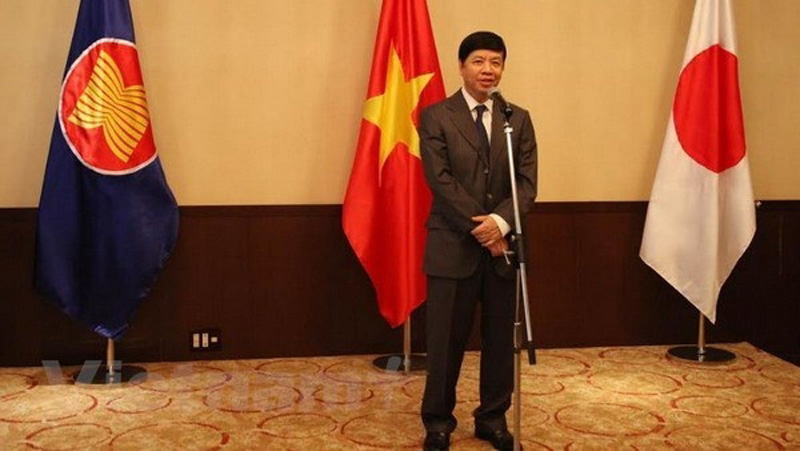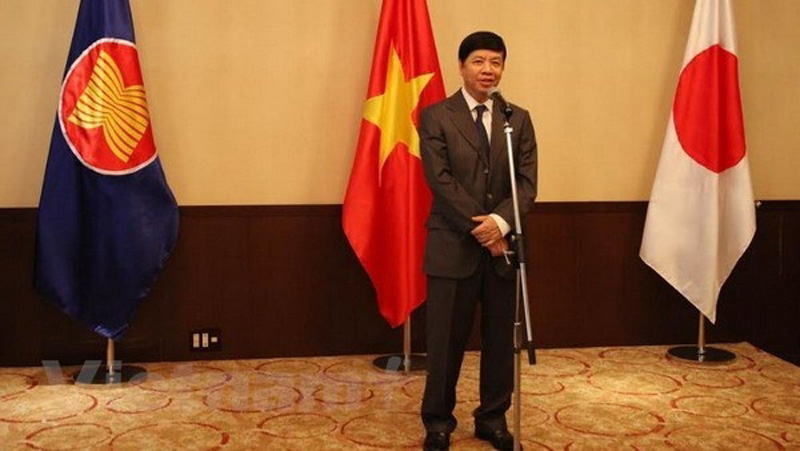
The Vietnam Festival 2018 will take place at the Yoyogi Park in Tokyo between 10 am and 8 pm on May 19 and 20.

Vietnamese Ambassador
to Japan
Nguyen Quoc Cuong addressing the press briefing.
Speaking at a press conference for the event, which was held
in Tokyo on
April 23, Vietnamese Ambassador to Japan Nguyen Quoc Cuong said the festival is
part of activities celebrating 45 years of the two countries’ diplomatic
relations.
It is an opportunity for
overseas Vietnamese to remember their home country and for Japanese friends to
learn more about Vietnam,
the diplomat noted.
After a decade, the Vietnam
Festival has become a big draw for both Vietnamese and Japanese living around Tokyo. In 2017, the
number of attendees amounted to 180,000.
Also at the press conference,
General Secretary of the festival’s organising board Aoyagi Youichirou
highlighted the significance of the event for people-to-people exchanges
between Vietnam and Japan.
He said this year it will
build on the successes of past editions to contribute to boosting mutual
understanding and bilateral ties.
The festival will feature 110
stalls classified into four categories of traditional cuisine, entertainment,
music, and tourism. Performances of Japanese artists and Vietnamese singers and
students will take place on the main stage.
Vietnam Festival 2018 is expected to draw 150,000
visitors.
Source: NDO
With an increasingly vibrant and widespread emulation movement aimed at building cultured residential areas and cultured families, Yen Thuy District has been making steady progress toward improving both the material and spiritual well-being of its people, while fostering a civilized, prosperous, beautiful, and progressive community.
Once lacking recreational spaces and community facilities, Residential Group 2 in Quynh Lam Ward (Hoa Binh City) has recently received attention for the construction of a new, spacious, and fully equipped cultural house. The project followed the model of state support combined with public contributions in both labor and funding.
The "All people unite to build cultural life" movement, which has been effectively integrated with Kim Boi district’s socio-economic development goals, is fostering a lively spirit of emulation across local residential areas, hamlets, villages, public agencies, and enterprises. In addition, through the initiative, traditional cultural values are being preserved and promoted, while community solidarity and mutual support in poverty reduction and economic development are being strengthened.
A working delegation of the Hoa Binh provincial People’s Committee led by its Permanent Vice Chairman Nguyen Van Toan on June 11 inspected the progress of a project to build the Mo Muong Cultural Heritage Conservation Space linked to tourism services in Hop Phong commune, Cao Phong district.
Born and growing in the heroic land of Muong Dong, Dinh Thi Kieu Dung, a resident in Bo town of Kim Boi district, in her childhood was nurtured by the sweet lullabies of her grandmother and mother. These melodies deeply imprinted on her soul, becoming an inseparable part of her love for her ethnic group's culture. For over 20 years, this love for her hometown has driven Dung to research, collect, and pass down the cultural values of the Muong people to future generations.
In the final days of May, the Ethnic Art Troupe of Hoa Binh Province organized performances to serve the people in remote, mountainous, and particularly disadvantaged areas within the province. These were not just ordinary artistic shows, but they were the meaningful journeys aimed at spreading cultural values, enhancing the spiritual life of the people and contributing to the preservation of ethnic minority cultural identities.



